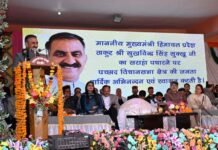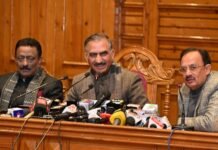In a landmark initiative that underscores its commitment to sustainable agriculture, Himachal Pradesh has become the first state in India to introduce Minimum Support Price (MSP) for crops grown through natural farming methods. The bold move was highlighted during the recent ‘Manthan Baithak’ on co-operatives held in New Delhi, where Union Home and Cooperation Minister Amit Shah lauded the state for leading the country in natural and chemical-free farming innovations.
Praising Himachal Pradesh for its commitment, Union Minister Amit Shah remarked, “Himachal mein Natural Farming mein bahut achay experiments hue hain” (Himachal has done excellent experiments in natural farming). His commendation signified national recognition of the policies initiated by Chief Minister Thakur Sukhvinder Singh Sukhu, who has actively spearheaded the movement towards chemical-free and sustainable agriculture in the hill state.
Natural farming has seen remarkable growth in Himachal, where more than 80 percent of the population lives in rural areas and relies heavily on agriculture, horticulture, and animal husbandry for their livelihoods. Recognizing this dependence, the state government has emphasized natural farming not just as an environmental choice but also as an economic strategy to strengthen the rural economy.
Chief Minister Sukhu shared that more than 2.23 lakh farmers and horticulturists across nearly all panchayats in the state have adopted natural farming, either partially or fully. With this widespread participation, Himachal is paving the way for a sustainable agricultural model for other states to follow. The government has already implemented MSP for several crops grown under natural farming. For instance, maize is now procured at ₹40 per kilogram, up from ₹30 last year. Around 400 metric tons of maize have been purchased from 1,509 farmers under this policy. Similarly, wheat is being procured at ₹60 per kilogram, and the state has introduced an MSP of ₹90 per kilogram for raw turmeric produced through natural farming. This turmeric will be processed and marketed under the newly established brand ‘Himachal Haldi’.
The government’s broader goal is to connect approximately 9.61 lakh farmers with natural farming in a phased manner. This initiative not only supports environmental goals but also ensures that farmers receive fair and remunerative prices, encouraging long-term commitment to organic and traditional farming practices.
In another pioneering step, the state government has declared the remote Pangi Sub-Division in Chamba district as Himachal’s first official “natural farming sub-division.” This initiative is aimed at preserving traditional agricultural practices, ensuring food security, and supporting sustainable rural livelihoods in the tribal valley. The decision has ignited a wave of enthusiasm and pride among local farmers. At present, 2,244 farmer families are practicing natural farming in Pangi, and the government is working toward transitioning all 2,920 hectares of cultivated land in the region—covering agriculture, horticulture, and allied sectors—into a 100 percent natural farming zone.
The Pangi initiative is not just about farming. It is also about revitalizing tribal entrepreneurship, protecting heirloom seed varieties, and celebrating the region’s unique agro-cultural legacy. For farmers who were previously forced to lease out their land while living elsewhere, this move offers renewed economic autonomy and dignity.
To support the marketing of naturally grown produce, the government is also developing infrastructure in 10 designated market yards, where farmers will be able to directly sell their chemical-free crops. Under the Prakritik Kheti-Khushal Kisan Yojana, a total expenditure of ₹27.60 crore was incurred during the 2023–24 and 2024–25 fiscal years to bolster this movement.
With these progressive policies and dedicated investment, Himachal Pradesh is not only empowering its farmers but also redefining the narrative of agricultural development in India. Its success in promoting natural farming backed by MSP is now being seen as a potential national model, as policymakers across the country look to Himachal for inspiration in creating a more sustainable and farmer-friendly agricultural ecosystem.
#HimachalPradesh #NaturalFarming #MSPforFarmers #SustainableAgriculture #HimachalHaldi #PangiModel #ThakurSukhvinderSinghSukhu #AmitShah #OrganicFarmingIndia #AutoWebGeneratedNews
This is an auto web-generated news web story.





